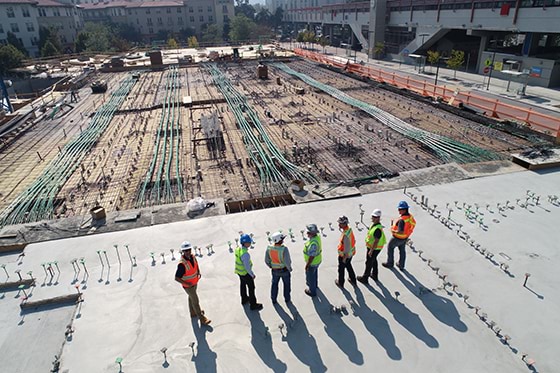Should a councillor meet with developers? This is a question we are often asked about in our integrity work – especially as the issue has received more attention in recent years.
Councillors are often required to make decisions about planning and developments in their municipality and as part of seeking information, may interact with developers on upcoming projects.
The community is often concerned about the potential influence of developers especially when there are large sums of money at stake. This is potentially an issue with councils on Melbourne’s outer fringe experiencing population growth.
Operation Sandon has thrown the issue into the spotlight. The Independent Broad-based Anti-corruption Commission (IBAC) operation held public hearings in 2019 and 2020 into allegations of serious corrupt conduct in relations to planning and property development decisions at the City of Casey. The hearings looked at the transparency and integrity of planning and property development decision making, including:
- donations or in-kind assistance to election candidates
- donations, gifts, pro bono services or other hospitality
- the use of professional lobbyists or planning consultants.
Until IBAC’s report is released with specific recommendations, councils can still work to improve transparency and minimise the risk of corruption in relation to planning and property development decisions in their own communities.
1. Councillors should avoid comment before a decision
The role of council staff is to assess the application and provide an impartial, professional opinion and recommendation to the councillors. The role of an elected councillor in the decision-making process is to approve or decline the application on the information and recommendation provided by council staff. To avoid prejudicing the eventual decision, councillors must not make up their minds about a development application until they have read the officer's reports and heard all sides of the debate.
Any involvement a councillor has with a development application during its assessment has the potential to damage the integrity of the final determination. It is important that councillors avoid making public comments that could be seen as supporting or opposing an application.
In addition, councillors should not be seen to be trying to influence the public by commenting on the application or signing petitions during the public comment period.
2. Councillors should avoid meeting developers one-on-one
We recommend that councillors should not be meeting with developers one-on-one if they have an application before council or are about to make one. A one-on-one meeting with a developer runs the risk of a councillor being accused of bias.
Requests for a meeting should go through official council channels, such as a generic council inbox. Councillors should only meet with a developer with a council officer present. Alternatively, councils could require that all councillors are invited to any meeting with developers.
If councillors were approached as the ward representative, they might still need to engage with developers. However, it is important for councillors to be mindful if a developer has or will soon have an application before council.
3. Councillors should avoid accepting gifts and hospitality from developers
Councillors should be open and transparent in their dealing with developers. This will protect them from any situations which may create a conflict of interest. They should avoid accepting hospitality or gifts of any sort from developers and lobbyists.
Councillors also need to consider their council’s gift policy if they do accept a gift of any kind from a developer or planning applicant.
It is important for councillors to remember that they need to make strategic decisions which benefit the municipality – but they need to ensure they are complying with existing planning schemes.
4. Councils should create a policy to guide councillor interactions with developers
Creating a policy which clearly sets out how councillors should interact with developers will create the ground rules for interactions, help with transparency and manage community expectations. Everybody will understand what is expected and this will aid oversight.
5. Councils should keep a register of councillor interactions with developers
Keeping a record of the interactions councillors have with developers will ensure any meetings are open and transparent and available for the public to see.
Updated


